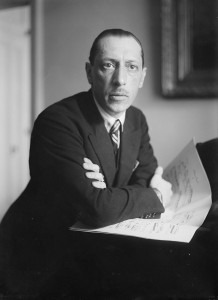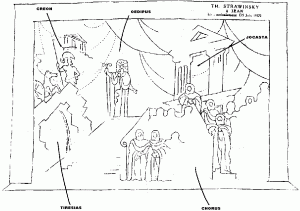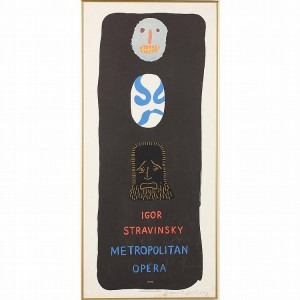
Igor Stravinsky
We start in the middle of the story: A plague has hit Thebes and the oracle declares it is because the murderer of the previous king, Laius, is sheltering in the city. Oedipus, the new king, has vowed to find the murderer of the old king, who was killed on the road to Delphi. He sends his brother-in-law Creon to start the inquiries and eventually finds out that it was himself, Oedipus, who inadvertently killed Laius in an argument they had on the right-of-way. Having freed the region from the affliction of the Sphynx, Oedipus marries the local queen, Jocasta. Thus, he has fulfilled a prophecy made when he was born: that he would murder his father and marry his mother. It was to avoid this that Oedipus had been sent away 20 years earlier, but in the end, the prophecy was fulfilled. Creon returns, all is revealed and Jocasta kills herself at the revelation. Oedipus blinds himself and asks to be exiled forever.
Stravinsky’s setting is to a text written by Jean Cocteau in French, was then translated into Latin. The parts of the narrator are to be spoken in the language of the audience, while the chorus sings in Latin.

Cocteau’s 1927 stage design, included in the first edition score
Oedipus Rex started life as a concert performance rather like an oratorio, yet, by the next year, it was already on the Vienna State Opera Stage as an opera. The scenic designer Julie Taymor (you might be familiar with her and her designs for Disney’s The Lion King staging) did a stage version of this for the Saito Kinen Festival Matsumoto in Japan in 1992. It was then filmed in 1993 by Taymor for television with Kayoko Shiraishi (Narrator), Philip Langridge (Oedipus), Jessye Norman (Jocasta), and Bryn Terfel (Creon), with Seiji Ozawa conducting. In keeping with the tradition of the part of the Narrator being spoken in the local language, the narrator in the film speaks in Japanese, as the film was made for NHK Television.

David Hockney’s poster for the Stravinsky triple bill of Rite of Spring, Le Rossignol, and Oedipus Rex
Oedipus Rex is one of the most powerful of modern opera, with the Greek tragedy of the unavoidable horrors of one’s fate always threatening, even when one is at one’s happiest.

